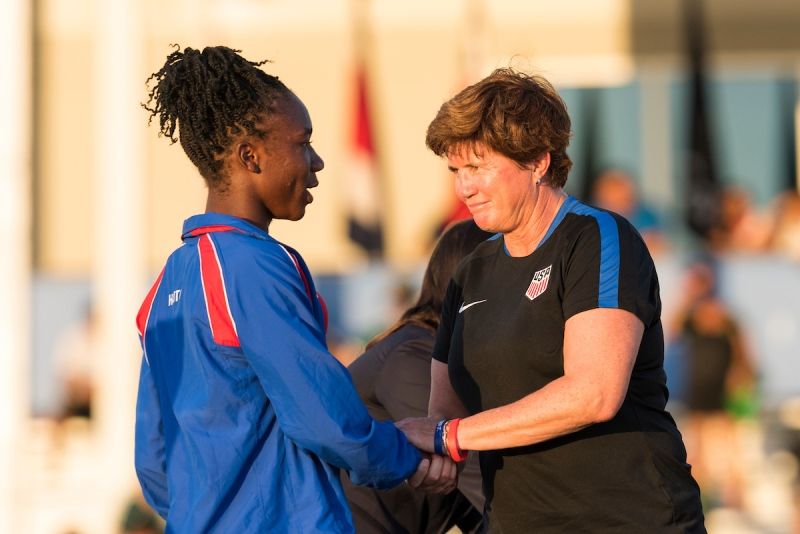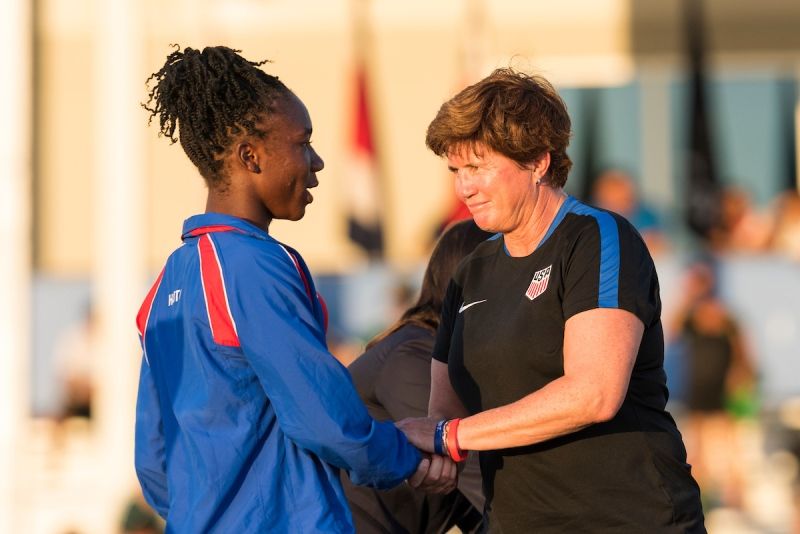CHICAGO (Dec. 9, 2018) – April Heinrichs, a world champion as a player, coach and administrator, who captained the USA to the first FIFA Women’s World Cup title in 1991 and then embarked on a long career in support of the women’s game, has been named the 2019 winner of U.S. Soccer’s prestigious Werner Fricker Builder Award.
“I sincerely enjoyed working with youth players and supporting our coaches in their efforts to develop players and teams,” Heinrichs said. “I am proud knowing that we will always be a world leader in women’s soccer on and off the field and that our players will represent the USA with pride as they compete for every championship.”
As U.S. Soccer’s highest honor, the Werner Fricker Builder Award is given to an individual or group of individuals who dedicate at least 20 years of service to the sport, working to establish a lasting legacy in the history and structure of soccer in the United States. The award recognizes those who have developed programs that will outlast their own involvement in the sport. The award was first presented in 2002.
“April is a true leader and pioneer of the women’s game,” said U.S. Soccer President Carlos Cordeiro. "The impact she made on several generations of players was immeasurable, and her passion with our National Teams has been inspirational. We all owe April a debt of gratitude for her years of selfless work in pursuit of excellence."
Heinrichs’ impact on the sport dates to the mid-1980s when she starred on some of the first collegiate teams at the University of North Carolina, helping the Tar Heels win three NCAA titles.
She was a U.S. Women’s National Team pioneer, earning her first cap in 1986 in the USA’s fifth-ever game and was a part of the famed “Triple-Edged Sword” alongside Michelle Akers and Carin Gabarra that helped lead the USA to that first Women’s World Cup title in China in 1991. She scored 35 goals in 46 international games.
Knee injuries ended her playing career prematurely. Her last game for the USA was the 1991 Women’s World Cup Final, a 2-1 win over Norway, but she quickly transitioned into coaching, first at the collegiate level before serving as an assistant for the USA at the 1995 Women’s World Cup and at the 1996 Olympics with the first team to win a gold medal in women’s soccer.
Following the Olympics, she took over as the head coach of the U.S. Under-16 National Team. She coached the U.S. U-16s for four years prior to taking the job as Head Coach and Technical Director for the U.S. Women’s National Team program in January 2000.
Heinrichs served as the USA’s head coach for five years from 2000-2004, coaching the team in two Olympic Games, winning a silver medal in 2000 and a gold medal in 2004. She also coached the USA in the 2003 FIFA Women’s World Cup, where the Americans finished third. She was the fourth coach, and first female head coach, in the history of the program. In her time at the helm of the U.S. team, Heinrichs compiled an 87-17-20 record.
In 2011, she was appointed Technical Director for the USA’s Youth National Teams and oversaw impressive and important growth within the U.S. Youth National Teams that now include a staff of seven full-time coaches, one head coach for each of the Youth National Team age level from U-14 through U-20.
The hiring in 2011 of Heinrichs (and Jill Ellis, who is now the head coach for the senior Women’s National Team), marked the first time U.S. Soccer had appointed full-time positions to oversee the Women’s Youth National Team program’s overall development. Earlier this year, she announced that she would step down from the position after eight years.
Heinrichs won the U.S. Soccer Female Athlete of the Year award twice, in 1986 and 1989, and was later voted female player of the 1980s by Soccer America Magazine. In 1998, she became the first female player inducted into the National Soccer Hall of Fame.
She played four years at the UNC and was named a First-Team All-American three times. Heinrichs completed her career at UNC as the all-time NCAA leader in points scored with 225 (87 goals, 51 assists), a record that has since been eclipsed. North Carolina registered an 85-3-2 record during her career, and she became the first women’s soccer player in school history to have her jersey retired when UNC took her No. 2 out of rotation.
Following her graduation from North Carolina with a bachelor’s degree in radio, television and motion pictures, Heinrichs was one of the first American women to play professionally in Europe, enjoying stints with Italian clubs Juventus and Prato.
Heinrichs also has extensive coaching experience in the college game, having been head coach at the University of Virginia, the University of Maryland, Princeton University and UC Irvine. She has a 119-86-16 overall collegiate record.
Heinrichs was named the head coach at the University of Virginia before the 1996 season and led the Cavaliers to four NCAA playoff berths while compiling a record of 52-27-7. Prior to her time at UVA, Heinrichs served as head coach at the University of Maryland, coaching her first season with the Terrapins in 1991 and earning ACC Coach of the Year honors in 1995. Prior to that she was the head coach at Princeton University for one season. Heinrichs also served one season as an assistant coach at the College of William & Mary and coached one season at UC Irvine in 2006.
In 2000, she was named as the inaugural recipient of the NSCAA Women’s Committee Award of Excellence for her outstanding long-term service and contribution toward improvement and advancement of women’s soccer in the United States. Heinrichs has held a USSF “A” coaching license since 1990.
“When I look back, I’m reminded how the game has grown so quickly, it’s hard to imagine how far we have come,” Heinrichs said. “And when I look forward, I’m reminded there is still much more we can all do. Our WNT is poised to attack opponents in the upcoming Women’s World Cup with talent, tactical understanding, and depth at every position which we haven’t seen since the 1990s. I’m so proud of the growth of our Women’s Youth National Team program over the most recent few years. We have grown from zero full-time staff in 2011 to seven full-time coaches today and a handful of full-time support staff. What I’m most excited about and proud of is that we finally articulated and implemented our USA style of play in attacking and defending. You can now look at every team in our system and see the USA way of playing.”
Heinrichs is the fourth consecutive winner to come from the women’s game, following Anson Dorrance (2016), 1991 FIFA Women’s World Cup champion goalkeeper Mary Harvey (2017) and beloved Hall of Fame coach Tony DiCicco, who passed away in June of 2017.
The award is named for Werner Fricker who served as U.S. Soccer President from 1984 to 1990 and was inducted into the National Soccer Hall of Fame in 1992. Fricker is widely credited for playing a major role in bringing the 1994 FIFA World Cup to the United States. Born in Yugoslavia and raised in Austria, Fricker lived his adult life in Pennsylvania, where he was a star midfielder for the United German Hungarians of Philadelphia soccer club from 1954 to 1969 and was a member of the 1964 U.S. Olympic Team.
The U.S. Soccer president appoints a task force to review nominations. The nomination and consideration process takes place annually with a maximum of one award given each year; however, the Selection Committee is not required to bestow the award annually.






